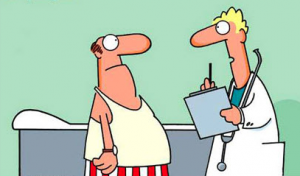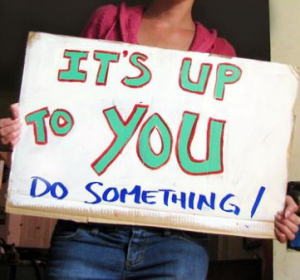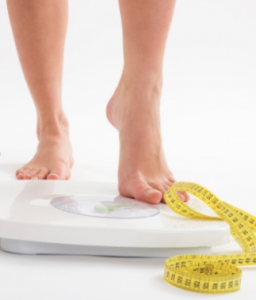Hypertension Numbers Up!!
Thanks to the new blood pressure guidelines, the number of people who are now considered to have Hypertension has risen substantially in the American adult population.
As a result of this shifting downwards of the blood pressure categories - according to the new blood pressure chart - anyone with a BP of 130/80 is now considered to have Hypertension Stage 1, whereas previously the parameter was 140/90 and above.
This naturally has caused much concern and controversy as 30 million more American adults now fall into the high blood pressure category and are wondering how to deal with this new health problem which did not exist before the change in the Guidelines. Naturally many are going to turn to their Doctors for advice.
The Pressure is on..

Welcome to the new class of prehypertensives, Mr Jones!!
This then puts a lot more pressure on the Doctors who are now responsible for evaluating and coming up with treatment plans to meet these new guidelines. And as we know on the one side they have to contend with heavy pressure from the Pharmaceutical Reps to market Big Pharma’s products, whilst at the same time they are charged with finding the best treatment approach for their patients.
And some doctors will undoubtedly choose the path of least resistance and automatically choose to start their newly diagnosed hypertensive patients on prescription medications…
BUT NOT SO FAST!
A growing debate is developing amongst medical experts as to what is the best way of intervening in people who have hypertension, and in particular those who have readings in the mild or prehypertensive range. Many of these people have been already placed on blood pressure drugs, or are being pushed to go on such drugs by their Doctors.
But information is available to suggest that medications used to treat mild hypertension do not have any success in actually mitigating the severest rick factors of ongoing hypertension - death from stroke and/or heart attack.
In fact an article in the BMJ (British Medical Journal) from September suggested that unlike treating patients who have moderate to severe high blood pressure with medication, the benefits for patients who have mild hypertension by putting them on BP drugs is not the same. There is no hard evidence that the risk of cardiovascular disease for those people with mild or prehypertension is reduced by use of medication.
As senior author of the paper, Vikas Saini, MD from Harvard Medical School, contends:
“before you subject someone to lifelong medical therapy and its potential side effects, be sure that other elements like lifestyle changes have really been given a fair shot. That means don’t pull the trigger too quickly,”
Indeed, Dr Saini believes that the pressure on Doctors to help patients change their lifestyles in a 5-10 minute interview at the Doctor’s Office is really unfair and unreasonable. In his opinion instead there should be a shift away from the use of medical treatment to an emphasis on improved public health awareness and resources.
Time to step up!
 Okay folks this is where you come in and decide your best approach to the situation…
Okay folks this is where you come in and decide your best approach to the situation…
If you have just been catapulted into the new categories of Elevated (120-129/80) or Hypertension Stage 1 (130-139/80-89) under the new guideline changes, there is a very good chance that you can treat your newly found hypertension by making some lifestyle changes, rather than thinking that you automatically need to be put on BP medication.
Indeed some of the experts who have reviewed the new guidelines, and what they mean to those extra 30 million adult Americans who have been affected by the changes, have expressed the view that 80% of the newly diagnosed hypertensive cases will be able to lower their BP back into the normal range of under 120/80 simply by making some healthy changes in their diets and in their lifestyles.
The important thing here is not to ignore the situation and realize that - and this really is intuitive! - the lower you can maintain your blood pressure, the healthier it is for you in the long run.
As Dr Dr. George Philippides, (chief of cardiology at Newton-Wellesley Hospital and former past President of the NE Division of the American Heart Associaton,) commented when being interviewed after the changes last November.
The new guidelines can act as a wake-up call for both patients and practitioners and they can give us a chance to
” look at our lifestyle and [see] how we can help patients get to a healthier cardiovascular lifestyle”
It’s all about Lifestyle Changes
This is where the rubber hits the road. There are three major factors which can make a terrific difference in the task of naturally reducing blood pressure.
- DIET
- EXERCISE
- WEIGHT LOSS
DIET - My advice for anyone wanting to modify their diet is firstly to cut our all processed foods, reduce sugar intake as much as possible and check out the DASH - Dietary Approaches to Stopping Hypertension Diet
This DASH Diet was developed specifically to help people lower their BP and it has been extremely successful. If you are interested in learning more about this Diet click >> HERE << for my in depth review of the Diet itself.
I also suggest that eliminating refined salt consumption should be on the list, too.
But the body does need salt to function properly, so I recommend that you take the control when it comes to adding the salt in your diet.. and use either Himalayan Pink Salt
or Hawaiian Rock Salt.
Both are considered whole salts and contain many trace elements the body needs for optimal functioning.
EXERCISE - Estimates show that almost 50% of American adults lead a sedentary or near-sedentary lifestyle. The importance of exercise or activity in general cannot be overemphasized. We were not made to sit all day and not move around!
Check out my post on Sitting and Blood Pressure to see how harmful a lack of activity is for us humans.
In addition, the act of exercising and consequent increased demand on the muscles causes the body to produce increased amounts of nitric oxide which dilates blood vessels to allow blood to flow more easily in order to satisfy the increased oxygen requirement for the muscles. This in turns causes blood pressure to fall.
So being and staying active is a great way of managing your blood pressure. And the body benefits from the increased nitric oxide for some time after the exercise is over!
WEIGHT GAIN - Experts agree that obesity and being overweight are major risk factors for developing high blood pressure.  Simply put the increased weight puts a heavier toll on the heart and this in time damages blood vessels and can lead to complications like loss of flexibility of the arteries and eventually hypertension. So losing those extra pounds is very good news for your blood pressure.
Simply put the increased weight puts a heavier toll on the heart and this in time damages blood vessels and can lead to complications like loss of flexibility of the arteries and eventually hypertension. So losing those extra pounds is very good news for your blood pressure.
By the way, one of the amazing and beneficial side effects of people using the DASH DIET, which researchers have uncovered, was that not only did the Diet plan reduce blood pressure but it also had great weight loss potential.
This in fact resulted in a win-win situation for people who had started on the Diet purely to help their hypertension issues. They were also able to lose weight. Increased weight loss leads to lower BP too!
So these days the DASH DIET is very popular amongst people wanting to lose weight. But the net effect is overall improvement in health and that is indeed a good thing!!
Apply Common Sense Here
In conclusion, those of you who have been caught by the shifting goalposts of new the Blood Pressure Guidelines have been handed a challenge which, if your are successful, will ultimately improve your overall health - not only your BP readings! It’s time to take stock and look at options which will enable you to stay in control of the situation.
By undertaking some lifestyle modifications around Diet, Exercise and Weight Loss you can benefit from a self-guided natural approach to managing your blood pressure!
It may take some self-discipline at the outset, but I assure you the rewards will be well worth it in the long run!!
It’s Your Turn
If you have now been caught in the revised BP Guidelines and now are considered pre- or hypertensive, what will you do?
Will you been okay with being placed straight on to medications to control your blood pressure? Or will you be look at other options first, such as some of the lifestyle changes I have mentioned in this blog?
I would love to hear your thoughts on this subject below in the comments section.
